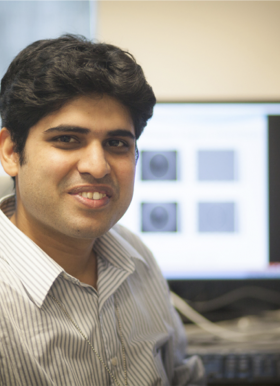
Abhinav Jha
- Email: a.jha@nospam.wustl.edu
Dr. Abhinav K. Jha will be joining Washington University in St. Louis in April 2018 as an Assistant Professor of Biomedical Engineering and of Radiology. He is currently a faculty at the Department of Radiology, Johns Hopkins University School of Medicine. Dr. Jha obtained his PhD from the College of Optical Sciences, University of Arizona, where he was the valedictorian of his graduating batch.
Dr. Jha’s research interests are in the design of medical imaging systems and algorithms for optimized performance in clinical tasks using quantitative measures of task performance. These measures are obtained using computational imaging, image science, and signal-processing-based approaches. He has made several contributions to this field, including devising novel methods for objective assessment of image quality (OAIQ), image-reconstruction, image-analysis and parameter-quantification, evaluate imaging methods using patient data in the absence of ground truth (no-gold-standard evaluation), using parallelized computing hardware to design practical versions of these methods, and clinical application. His research has had important clinical and pre-clinical impacts. For example, in collaboration with the Arizona Cancer Center, we developed methods to quantify imaging biomarkers for assessing therapeutic response to breast cancer that had metastasized to the liver in a prospective clinical trial. The developed methods were essential for the computed imaging metrics to serve as biomarkers. Further, he is one of the first ones to demonstrate the impact of OAIQ in improving diffuse optical imaging (DOI) and diffusion MRI, both in the context of cancer imaging. A current focus is on extending the ideas of OAIQ to improve quantitative imaging, with applications such as in improving the reliability of imaging biomarkers for monitoring cancer-treatment response and in improving dosimetry.
He is a participant on the quantitative imaging biomarkers alliance (QIBA) biomarker committees on SPECT imaging and the Quantitative Imaging Network of the National Cancer Institute. He has given invited talks on his research at various research labs such as at the Food and Drug Administration (FDA), University of California San Francisco, University of Washington, Autonomous University of Barcelona, Spain, and Indian Institute of Science. His research and teaching activities have been recognized through awards such as the Bradley-Alavi Fellowship, William Wolfe Endowed Family Scholarship, Technology Research Initiative Fund (TRIF) Imaging Fellowship, the Rolyn Optics Outstanding Teaching Associate Award, the Michael B. Merickel Best Student Paper Award at SPIE Medical Imaging conference, the Young Investigator Symposium Award of Distinction for Translational Sciences at the ECOG-ACRIN meeting and a Therapy Center for Excellence Young Investigator award at the SNMMI Annual meeting.